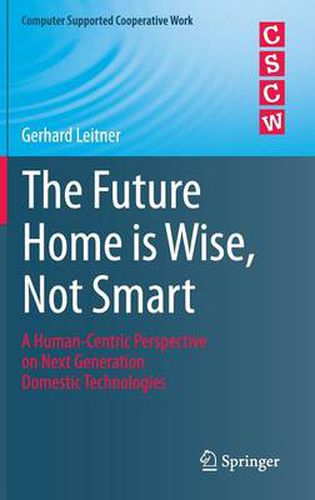Readings Newsletter
Become a Readings Member to make your shopping experience even easier.
Sign in or sign up for free!
You’re not far away from qualifying for FREE standard shipping within Australia
You’ve qualified for FREE standard shipping within Australia
The cart is loading…






This title is printed to order. This book may have been self-published. If so, we cannot guarantee the quality of the content. In the main most books will have gone through the editing process however some may not. We therefore suggest that you be aware of this before ordering this book. If in doubt check either the author or publisher’s details as we are unable to accept any returns unless they are faulty. Please contact us if you have any questions.
This book introduces the concept of the wise home. Whilst smart homes focus on automation technologies, forcing users to deal with complex and incomprehensible control and programming procedures, the wise home is different. By going beyond intelligence (or smartness) the wise home puts technology in the background and supports explicit (enhanced user-experience) as well as implicit (artificial intelligence) interaction adequate to the end-user’s needs.
The theoretical basis of the wise home is explored and examples for its application for future living are presented based on empirical studies and field work carried out by the author. Principles of HCI and the meaning of the home from differing scientific perspective are discussed and a research model (based on the concept of user experience (UX)) and iterations is introduced. This has resulted in field deployment guides being produced through a systematic development process.
The Future Home is Wise, not Smart will be essential reading to home system developers, designers and researchers, responsible for smart home deployment or Ambient Assisted Living (AAL) who will get insights on how to follow a novel approach in developing and adapting smart home systems to their users’ needs. Students with an interest in software design for pervasive systems will benefit by receiving information on how to develop and customise systems for the specific needs of living environments.
$9.00 standard shipping within Australia
FREE standard shipping within Australia for orders over $100.00
Express & International shipping calculated at checkout
This title is printed to order. This book may have been self-published. If so, we cannot guarantee the quality of the content. In the main most books will have gone through the editing process however some may not. We therefore suggest that you be aware of this before ordering this book. If in doubt check either the author or publisher’s details as we are unable to accept any returns unless they are faulty. Please contact us if you have any questions.
This book introduces the concept of the wise home. Whilst smart homes focus on automation technologies, forcing users to deal with complex and incomprehensible control and programming procedures, the wise home is different. By going beyond intelligence (or smartness) the wise home puts technology in the background and supports explicit (enhanced user-experience) as well as implicit (artificial intelligence) interaction adequate to the end-user’s needs.
The theoretical basis of the wise home is explored and examples for its application for future living are presented based on empirical studies and field work carried out by the author. Principles of HCI and the meaning of the home from differing scientific perspective are discussed and a research model (based on the concept of user experience (UX)) and iterations is introduced. This has resulted in field deployment guides being produced through a systematic development process.
The Future Home is Wise, not Smart will be essential reading to home system developers, designers and researchers, responsible for smart home deployment or Ambient Assisted Living (AAL) who will get insights on how to follow a novel approach in developing and adapting smart home systems to their users’ needs. Students with an interest in software design for pervasive systems will benefit by receiving information on how to develop and customise systems for the specific needs of living environments.